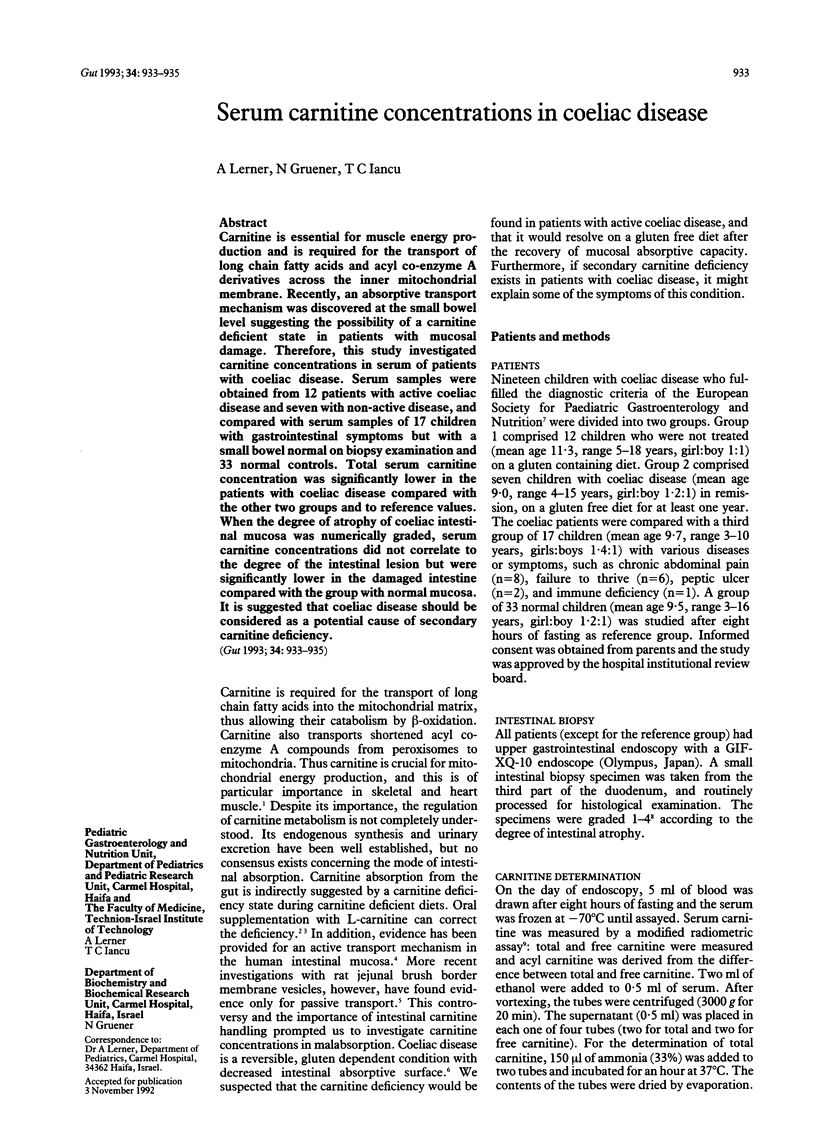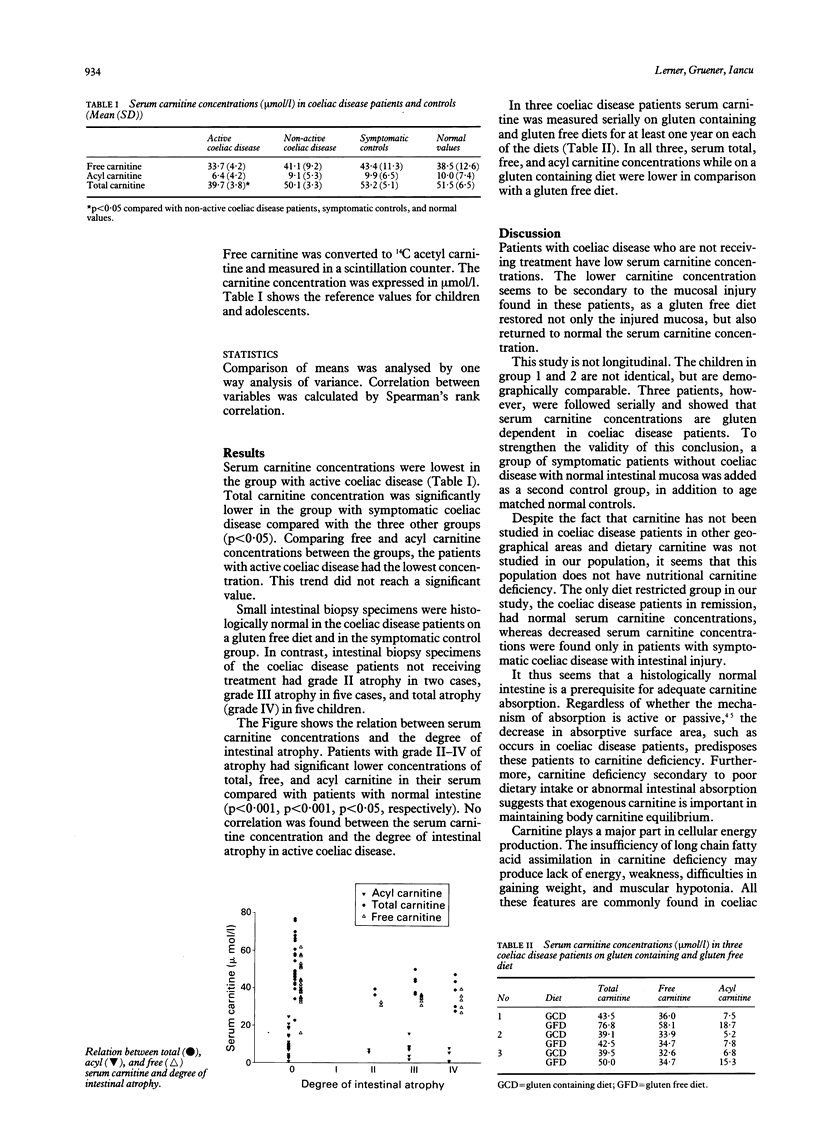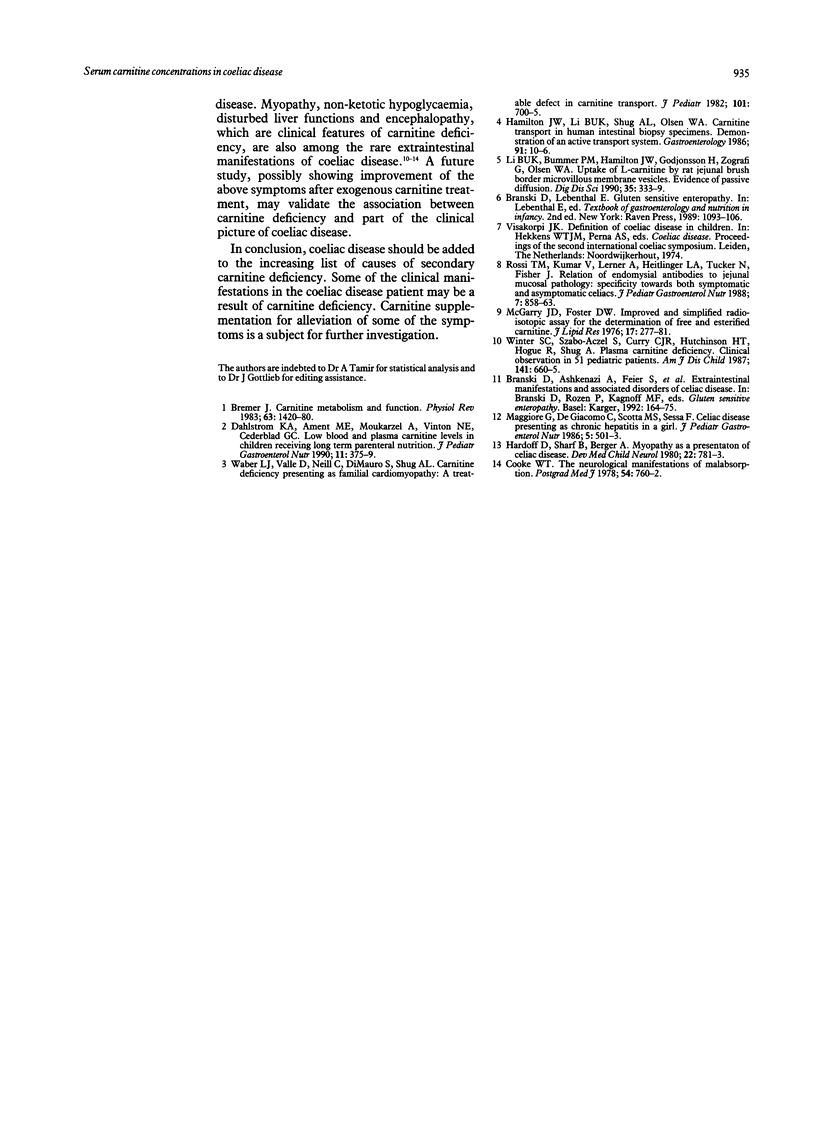Abstract
Carnitine is essential for muscle energy production and is required for the transport of long chain fatty acids and acyl co-enzyme A derivatives across the inner mitochondrial membrane. Recently, an absorptive transport mechanism was discovered at the small bowel level suggesting the possibility of a carnitine deficient state in patients with mucosal damage. Therefore, this study investigated carnitine concentrations in serum of patients with coeliac disease. Serum samples were obtained from 12 patients with active coeliac disease and seven with non-active disease, and compared with serum samples of 17 children with gastrointestinal symptoms but with a small bowel normal on biopsy examination and 33 normal controls. Total serum carnitine concentration was significantly lower in the patients with coeliac disease compared with the other two groups and to reference values. When the degree of atrophy of coeliac intestinal mucosa was numerically graded, serum carnitine concentrations did not correlate to the degree of the intestinal lesion but were significantly lower in the damaged intestine compared with the group with normal mucosa. It is suggested that coeliac disease should be considered as a potential cause of secondary carnitine deficiency.
Full text
PDF


Selected References
These references are in PubMed. This may not be the complete list of references from this article.
- Bremer J. Carnitine--metabolism and functions. Physiol Rev. 1983 Oct;63(4):1420–1480. doi: 10.1152/physrev.1983.63.4.1420. [DOI] [PubMed] [Google Scholar]
- Cooke W. T. The neurological manifestations of malabsorption. Postgrad Med J. 1978 Nov;54(637):760–762. doi: 10.1136/pgmj.54.637.760. [DOI] [PMC free article] [PubMed] [Google Scholar]
- Dahlström K. A., Ament M. E., Moukarzel A., Vinton N. E., Cederblad G. Low blood and plasma carnitine levels in children receiving long-term parenteral nutrition. J Pediatr Gastroenterol Nutr. 1990 Oct;11(3):375–379. doi: 10.1097/00005176-199010000-00016. [DOI] [PubMed] [Google Scholar]
- Hamilton J. W., Li B. U., Shug A. L., Olsen W. A. Carnitine transport in human intestinal biopsy specimens. Demonstration of an active transport system. Gastroenterology. 1986 Jul;91(1):10–16. doi: 10.1016/0016-5085(86)90432-4. [DOI] [PubMed] [Google Scholar]
- Hardoff D., Sharf B., Berger A. Myopathy as a presentation of coeliac disease. Dev Med Child Neurol. 1980 Dec;22(6):781–783. doi: 10.1111/j.1469-8749.1980.tb03745.x. [DOI] [PubMed] [Google Scholar]
- Li B. U., Bummer P. M., Hamilton J. W., Gudjonsson H., Zografi G., Olsen W. A. Uptake of L-carnitine by rat jejunal brush border microvillous membrane vesicles. Evidence of passive diffusion. Dig Dis Sci. 1990 Mar;35(3):333–339. doi: 10.1007/BF01537411. [DOI] [PubMed] [Google Scholar]
- Maggiore G., De Giacomo C., Scotta M. S., Sessa F. Celiac disease presenting as chronic hepatitis in a girl. J Pediatr Gastroenterol Nutr. 1986 May-Jun;5(3):501–503. doi: 10.1097/00005176-198605000-00031. [DOI] [PubMed] [Google Scholar]
- McGarry J. D., Foster D. W. An improved and simplified radioisotopic assay for the determination of free and esterified carnitine. J Lipid Res. 1976 May;17(3):277–281. [PubMed] [Google Scholar]
- Rossi T. M., Kumar V., Lerner A., Heitlinger L. A., Tucker N., Fisher J. Relationship of endomysial antibodies to jejunal mucosal pathology: specificity towards both symptomatic and asymptomatic celiacs. J Pediatr Gastroenterol Nutr. 1988 Nov-Dec;7(6):858–863. doi: 10.1097/00005176-198811000-00011. [DOI] [PubMed] [Google Scholar]
- Waber L. J., Valle D., Neill C., DiMauro S., Shug A. Carnitine deficiency presenting as familial cardiomyopathy: a treatable defect in carnitine transport. J Pediatr. 1982 Nov;101(5):700–705. doi: 10.1016/s0022-3476(82)80294-1. [DOI] [PubMed] [Google Scholar]
- Winter S. C., Szabo-Aczel S., Curry C. J., Hutchinson H. T., Hogue R., Shug A. Plasma carnitine deficiency. Clinical observations in 51 pediatric patients. Am J Dis Child. 1987 Jun;141(6):660–665. doi: 10.1001/archpedi.1987.04460060076039. [DOI] [PubMed] [Google Scholar]


